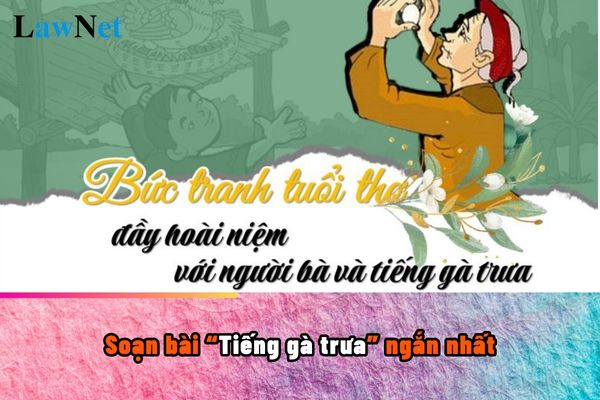What are guidelines on preparing the lesson "Tiếng gà trưa" for students in Vietnam? What literary knowledge is included in grade 7 Literature in Vietnam?
What are guidelines on preparing the lesson "Tiếng gà trưa" for students in Vietnam?
'Tiếng gà trưa' is one of the contents that students will study in the grade 7 Literature program.
The poem "Tiếng gà trưa" (The Rooster's Sound) by Xuân Quỳnh is one of the most beautiful and meaningful poems in Vietnamese poetry. The poem paints a simple, warm picture of the countryside while expressing the deep affection of a grandchild for their grandmother and homeland.
Teachers and students can refer to the following guidelines on preparing the lesson "Tiếng gà trưa":
|
Preparation of Lesson 'Tiếng gà trưa' *Structure and Content |
* Note: The information about the preparation for 'Tiếng gà trưa' is for reference purposes only./.

What are guidelines on preparing the lesson "Tiếng gà trưa" for students in Vietnam? What literary knowledge is included in grade 7 Literature in Vietnam? (Image from Internet)
What literary knowledge is included in grade 7 Literature in Vietnam?
Based on Subsection 2 Section 5 General Education Program in Literature issued together with Circular 32/2018/TT-BGDDT, the literature knowledge for grade 7 students includes:
- Cognitive values of literature
- The theme and subject of the text; the relationship between details and theme, how to determine the theme of the text; the attitude and feelings of the author expressed through the text
- Text summary
- Form of proverbs
- Themes, events, situations, storyline, space, time, characters in fables, and science fiction stories
- First-person and third-person narrators; the effect of each type of narrator in a narrative
- Some formal elements of four-word and five-word poetry: number of lines, words, rhyme, rhythm
- The lyrical quality, the ego, and the language of essays, and proselike writings
- Life experiences and understanding of literature
What is the age of grade 7 students in 2024 in terms of lunar and Gregorian calendars in Vietnam?
Based on Article 33 of the Regulations of lower secondary schools, upper secondary schools, and schools with multiple levels issued with Circular 32/2020/TT-BGDDT, the age of students in secondary schools is as follows:
Age of students in lower secondary schools
1. The age of students entering grade 6 is 11 years. The age of students entering grade 10 is 15 years. For students who have skipped a grade in a previous level or students entering a level at an age older than the specified age, the age for entering grades 6 and 10 is reduced or increased based on the age of graduation from the previous level.
- Students who are ethnic minorities, students with disabilities, students with particularly difficult circumstances, and students who return from abroad may enter schooling at an age higher than the specified age by up to three years.
- Students are not allowed to repeat a grade more than 3 times at each level of education.
- Students with good physical condition and early intellectual development can enter school earlier or skip a grade within the educational level. Specific cases are processed as follows:
a) Parents or guardians submit a request to the school.
b) The school principal forms an Assessment and Advice Council including basic members: representatives of school leadership and the Parent-Teacher Association; teachers teaching the student's current class.
c) Based on the assessment results of the council, the principal reviews and decides.
- Students within the prescribed age from abroad returning, and children of foreigners working in Vietnam may study in lower secondary schools at their residence or at another place if the school can admit them. Specific cases are processed as follows:
a) Parents or guardians submit a request to the school.
b) The principal organizes an assessment of the student's level and assigns a suitable class.
The age calculation for the year 2024 for birth years is as follows:
| Year of Birth | Age according to Lunar calendar | Age according to Gregorian calendar |
| 2000 | 25 | 24 |
| 2001 | 24 | 23 |
| 2002 | 23 | 22 |
| 2003 | 22 | 21 |
| 2004 | 21 | 20 |
| 2005 | 20 | 19 |
| 2006 | 19 | 18 |
| 2007 | 18 | 17 |
| 2008 | 17 | 16 |
| 2009 | 16 | 15 |
| 2010 | 15 | 14 |
| 2011 | 14 | 13 |
| 2012 | 13 | 12 |
| 2013 | 12 | 11 |
| 2014 | 11 | 10 |
| 2015 | 10 | 9 |
| 2016 | 9 | 8 |
| 2017 | 8 | 7 |
| 2018 | 7 | 6 |
| 2019 | 6 | 5 |
| 2020 | 5 | 4 |
| 2021 | 4 | 3 |
| 2022 | 3 | 2 |
| 2023 | 2 | 1 |
Therefore, according to the Lunar calendar 2024, grade 7 students are 13 years old; according to the Gregorian calendar 2024, grade 7 students are 12 years old.
*Note: Except for cases where students repeat a grade, skip a grade, or study at higher/lower ages than the specified age.

